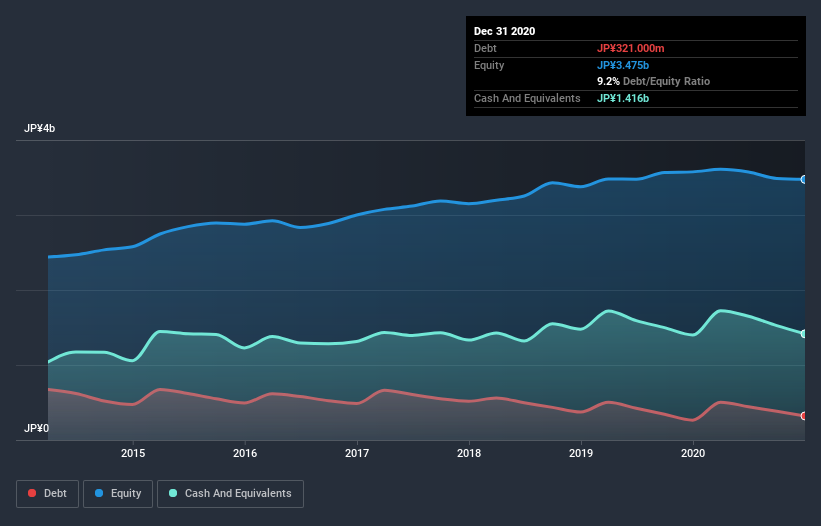
Some say volatility, rather than debt, is the best way to think about risk as an investor, but Warren Buffett famously said that 'Volatility is far from synonymous with risk.' It's only natural to consider a company's balance sheet when you examine how risky it is, since debt is often involved when a business collapses. We can see that Nix, Inc. (TYO:4243) does use debt in its business. But the real question is whether this debt is making the company risky.
When Is Debt A Problem?
Debt is a tool to help businesses grow, but if a business is incapable of paying off its lenders, then it exists at their mercy. Part and parcel of capitalism is the process of 'creative destruction' where failed businesses are mercilessly liquidated by their bankers. However, a more common (but still painful) scenario is that it has to raise new equity capital at a low price, thus permanently diluting shareholders. Of course, debt can be an important tool in businesses, particularly capital heavy businesses. When we think about a company's use of debt, we first look at cash and debt together.
View our latest analysis for Nix
What Is Nix's Net Debt?
The image below, which you can click on for greater detail, shows that at December 2020 Nix had debt of JP¥320.0m, up from JP¥264.0m in one year. But on the other hand it also has JP¥1.42b in cash, leading to a JP¥1.10b net cash position.

A Look At Nix's Liabilities
Zooming in on the latest balance sheet data, we can see that Nix had liabilities of JP¥900.0m due within 12 months and liabilities of JP¥740.0m due beyond that. On the other hand, it had cash of JP¥1.42b and JP¥894.0m worth of receivables due within a year. So it can boast JP¥670.0m more liquid assets than total liabilities.
This surplus liquidity suggests that Nix's balance sheet could take a hit just as well as Homer Simpson's head can take a punch. Having regard to this fact, we think its balance sheet is as strong as an ox. Succinctly put, Nix boasts net cash, so it's fair to say it does not have a heavy debt load! There's no doubt that we learn most about debt from the balance sheet. But you can't view debt in total isolation; since Nix will need earnings to service that debt. So if you're keen to discover more about its earnings, it might be worth checking out this graph of its long term earnings trend.
In the last year Nix had a loss before interest and tax, and actually shrunk its revenue by 19%, to JP¥3.4b. We would much prefer see growth.
So How Risky Is Nix?
While Nix lost money on an earnings before interest and tax (EBIT) level, it actually generated positive free cash flow JP¥78m. So taking that on face value, and considering the net cash situation, we don't think that the stock is too risky in the near term. With mediocre revenue growth in the last year, we're don't find the investment opportunity particularly compelling. The balance sheet is clearly the area to focus on when you are analysing debt. But ultimately, every company can contain risks that exist outside of the balance sheet. To that end, you should learn about the 3 warning signs we've spotted with Nix (including 1 which doesn't sit too well with us) .
At the end of the day, it's often better to focus on companies that are free from net debt. You can access our special list of such companies (all with a track record of profit growth). It's free.
If you’re looking to trade Nix, open an account with the lowest-cost* platform trusted by professionals, Interactive Brokers. Their clients from over 200 countries and territories trade stocks, options, futures, forex, bonds and funds worldwide from a single integrated account. Promoted
Valuation is complex, but we're here to simplify it.
Discover if Nix might be undervalued or overvalued with our detailed analysis, featuring fair value estimates, potential risks, dividends, insider trades, and its financial condition.
Access Free AnalysisThis article by Simply Wall St is general in nature. It does not constitute a recommendation to buy or sell any stock, and does not take account of your objectives, or your financial situation. We aim to bring you long-term focused analysis driven by fundamental data. Note that our analysis may not factor in the latest price-sensitive company announcements or qualitative material. Simply Wall St has no position in any stocks mentioned.
*Interactive Brokers Rated Lowest Cost Broker by StockBrokers.com Annual Online Review 2020
Have feedback on this article? Concerned about the content? Get in touch with us directly. Alternatively, email editorial-team (at) simplywallst.com.
About TSE:4243
Nix
Develops, manufactures, and sells precision engineering plastics parts, mechanical products, and fasteners in Japan and internationally.
Flawless balance sheet with solid track record.
Market Insights
Community Narratives



